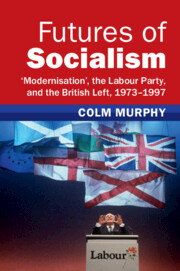Book contents
- Futures of Socialism
- Modern British Histories
- Futures of Socialism
- Copyright page
- Contents
- Figures
- Tables
- Acknowledgements
- Introduction: The Plural Modernisations of the British Left
- Part I Social Democracy and the Challenge to the Nation State
- Part II Identities and ‘Modern Socialism’
- Part III The Search for a Modernising Social Democracy
- Bibliography
- Index
Introduction: The Plural Modernisations of the British Left
Published online by Cambridge University Press: 25 May 2023
- Futures of Socialism
- Modern British Histories
- Futures of Socialism
- Copyright page
- Contents
- Figures
- Tables
- Acknowledgements
- Introduction: The Plural Modernisations of the British Left
- Part I Social Democracy and the Challenge to the Nation State
- Part II Identities and ‘Modern Socialism’
- Part III The Search for a Modernising Social Democracy
- Bibliography
- Index
Summary
The introduction begins by demonstrating the importance of ‘modernisation’ for left-wing debates in the second half of the twentieth century. After recapping the key staging posts of Labour’s trajectory from the 1970s to the 1990s, it then argues that existing histories obscure the diverse meanings and appeal of ‘modernisation’ through their current use of the term. I suggest that this hinders our understanding of both New Labour and many of their left-wing critics, and too readily accepts a teleological reading of history. Following a brief discussion of the method of the book, the introduction touches on the wider historical significance of this revised understanding of Labour’s ideological debates. It questions the idea of an ‘age of neoliberalism’ and introduces other themes of the late twentieth century of comparable significance to market liberalism: the challenge to the nation state from above and below; the rise of post-1968 ‘liberation movements’; deindustrialisation; and constitutional agitation. It ends by outlining the chapters.
Keywords
- Type
- Chapter
- Information
- Futures of Socialism‘Modernisation', the Labour Party, and the British Left, 1973–1997, pp. 1 - 38Publisher: Cambridge University PressPrint publication year: 2023

